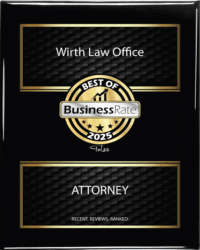Personal Injury
Personal Injury Basics: What Are Punitive Damages?
 Punitive damages don't always apply, but they do in some extreme cases. Now, punitive damages tend to hold two primary functions. Read more »
Punitive damages don't always apply, but they do in some extreme cases. Now, punitive damages tend to hold two primary functions. Read more »Personal Injury Basics: What Are Non-Economic Damages?
 Your non-economic damages are going to be the ones that are a bit harder to track down a specific number towards. Read more »
Your non-economic damages are going to be the ones that are a bit harder to track down a specific number towards. Read more »Personal Injury Basics: What Are Economic Damages?
 Now, your economic damages are your damages that have a very specific price tag. So for instance, that's going to be your property damage. Read more »
Now, your economic damages are your damages that have a very specific price tag. So for instance, that's going to be your property damage. Read more »Personal Injury Basics: What Are Damages?
 Your damages are your compensable injuries to yourself and your property as the result of a personal injury matter. Read more »
Your damages are your compensable injuries to yourself and your property as the result of a personal injury matter. Read more »Personal Injury Basics: 4 Elements of Negligence: Part 4: Damages
 Now in the legal context, the damages are what one person suffers due to that breach of duty. Read more »
Now in the legal context, the damages are what one person suffers due to that breach of duty. Read more »Personal Injury Basics: 4 Elements of Negligence: Part 3: Causation
 To use our ongoing theme of a car wreck, you have to show that the injuries of a person have been a direct result of that car wreck. Read more »
To use our ongoing theme of a car wreck, you have to show that the injuries of a person have been a direct result of that car wreck. Read more »Personal Injury Basics: 4 Elements of Negligence: Part 2: Breach of Duty
 If you need a personal injury attorney in Tulsa in which you are seeking legal help concerning your case, contact a Personal Injury Attorney. Read more »
If you need a personal injury attorney in Tulsa in which you are seeking legal help concerning your case, contact a Personal Injury Attorney. Read more »Personal Injury Basics: 4 Elements of Negligence: Part 1: Duty
 For any successful negligence claim, you first have to show that one party had a reasonable standard of care. Read more »
For any successful negligence claim, you first have to show that one party had a reasonable standard of care. Read more »Personal Injury Basics: What Is Negligence?
 negligence is when you have one party who owes a duty to another party, and they end up breaching that duty and it results in damages to that person. Read more »
negligence is when you have one party who owes a duty to another party, and they end up breaching that duty and it results in damages to that person. Read more »If You Don’t Have Insurance, Can You Recover Damages From a Car Wreck?
 Now, previously, the state of Oklahoma had what was called a pay-to-play law, and that if you didn't have car insurance then you were pretty limited on the damages you'd collect. They were exclusive to economic damages, meaning only what your medical bills were, you couldn't go for pain and suffering. Read more »
Now, previously, the state of Oklahoma had what was called a pay-to-play law, and that if you didn't have car insurance then you were pretty limited on the damages you'd collect. They were exclusive to economic damages, meaning only what your medical bills were, you couldn't go for pain and suffering. Read more »Does It Matter What You Say to an Insurance Company After a Car Wreck?
 Anytime you're speaking with an adjuster, be very careful about what you say and don't divulge more than you really have to. Read more »
Anytime you're speaking with an adjuster, be very careful about what you say and don't divulge more than you really have to. Read more »How Can You Tell if the Car That Hit You Is a Commercial Vehicle?
 One thing you can do if you get a police report is to see who the listed owner of the vehicle is. Not just the driver. Read more »
One thing you can do if you get a police report is to see who the listed owner of the vehicle is. Not just the driver. Read more »Can I Still Get Medical Treatment After a Car Wreck If I Don't Have Health Insurance?
 One thing you can ask medical providers is to see if they treat on what's called a third-party billing basis. Read more »
One thing you can ask medical providers is to see if they treat on what's called a third-party billing basis. Read more »Does It Matter Why I Was at a Location When I Was Injured?
 Depending on your reasoning for being at a location changes the duty owed to you by the owner of the property and keeping you safe. Read more »
Depending on your reasoning for being at a location changes the duty owed to you by the owner of the property and keeping you safe. Read more »Can You Still Get Compensation From the Insurance Company After Settling?
 The vast majority of the time, personal injury settlements are a one-and-done type of scenario. Read more »
The vast majority of the time, personal injury settlements are a one-and-done type of scenario. Read more »What Is a Premises Liability Case?
 It is the case of a dangerous condition, meaning that you were injured while on the property of another person due to their negligence. Read more »
It is the case of a dangerous condition, meaning that you were injured while on the property of another person due to their negligence. Read more »Do You Have to File a Lawsuit if You File an Insurance Claim?
 There are some firms out there that don't do lawsuits. They will always try to settle pre-litigation, and if it comes to a lawsuit, then they'll refer the case out. So that's something that you should not be afraid at all to speak with any potential legal counsel about. Read more »
There are some firms out there that don't do lawsuits. They will always try to settle pre-litigation, and if it comes to a lawsuit, then they'll refer the case out. So that's something that you should not be afraid at all to speak with any potential legal counsel about. Read more »Will Your Health Insurance Get Paid Back if They Pay Your Medical Bills From a Personal Injury Case?
 Now, the short answer is it depends. It largely depends on what contract you have with them. Read more »
Now, the short answer is it depends. It largely depends on what contract you have with them. Read more »Can You Still Get Compensated for Your Injuries if You’ve Previously Been Injured?
 Wirth Law Personal Injury Paralegal discusses whether or not you can still get compensated for injuries if you've already previously been injured. Read more »
Wirth Law Personal Injury Paralegal discusses whether or not you can still get compensated for injuries if you've already previously been injured. Read more »Should You Hide Anything About Your Car Wreck From Your Attorney?
 Now in the past, we've worked with quite a few clients who had certain skeletons in the closet that they would have preferred to remain there. A lot of the time, these will take the form of previous injuries or if they didn't have insurance at the time, a criminal record. Read more »
Now in the past, we've worked with quite a few clients who had certain skeletons in the closet that they would have preferred to remain there. A lot of the time, these will take the form of previous injuries or if they didn't have insurance at the time, a criminal record. Read more »Does the Type of Shoe That You Were Wearing During a Premises Liability Incident Matter?
 We've had some clients who were wearing skidproof workboats but were still the victim of a premises liability incident because there was very clear soap on the floor that they didn't see. Read more »
We've had some clients who were wearing skidproof workboats but were still the victim of a premises liability incident because there was very clear soap on the floor that they didn't see. Read more »If a Person Is Driving a Vehicle off the Clock, Is the Company Still Partially Liable?
 I've had some clients in the past who that was exactly the case. A person was driving. They were at a stoplight. The other person rear-ended them. They weren't on the clock at the time, but the vehicle was owned by his company. Read more »
I've had some clients in the past who that was exactly the case. A person was driving. They were at a stoplight. The other person rear-ended them. They weren't on the clock at the time, but the vehicle was owned by his company. Read more »Is Security Camera Footage Important if You Fall in a Store?
 Now, we've all heard the old phrase, "A picture's worth a thousand words," but I'm here to tell you, a video can be worth a thousand pictures. Read more »
Now, we've all heard the old phrase, "A picture's worth a thousand words," but I'm here to tell you, a video can be worth a thousand pictures. Read more »Should You Get Employee Contact Information if You Fall at a Store?
 One of the things that you can do, after you make sure your immediate medical needs are taken care of, is to see what store employees are around, or maybe, ideally, the ones who were there when the incident happened. And you can just briefly ask them, and always be as polite as you can, "Hey, could I get your contact information?" Read more »
One of the things that you can do, after you make sure your immediate medical needs are taken care of, is to see what store employees are around, or maybe, ideally, the ones who were there when the incident happened. And you can just briefly ask them, and always be as polite as you can, "Hey, could I get your contact information?" Read more »If a Person Hits Me With Their Car and They Are on the Clock, Is Their Company Liable Too?
 Now in the past, I've had a person who was on their way to work and another person who is making a delivery for their employer struck our client and the other person was on the clock at the time. They were within the scope of their employment. This fell under what's called respondeat superior, meaning their employer was partially responsible because the person was acting in the line of duty for their employer. As such, the employer was also a responsible entity in our client's claim. Read more »
Now in the past, I've had a person who was on their way to work and another person who is making a delivery for their employer struck our client and the other person was on the clock at the time. They were within the scope of their employment. This fell under what's called respondeat superior, meaning their employer was partially responsible because the person was acting in the line of duty for their employer. As such, the employer was also a responsible entity in our client's claim. Read more »




















